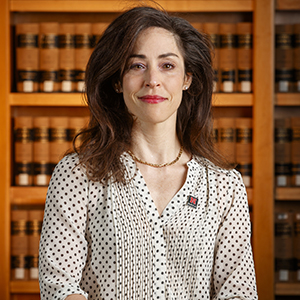Assistant Professor of Law

Biography
Elana Zeide teaches, researches, and writes about privacy and the legal, policy, and ethical implications of data-driven systems and artificial intelligence. She is an Assistant Professor at the University of Nebraska-Lincoln and part of its new interdisciplinary Nebraska Governance and Technology Center. Her work focuses on the modern day permanent record and how new learning, hiring, and workplace technologies impact education and access to opportunity. Recent articles include Student Privacy in the Age of Big Data, The Structural Consequences of Big Data-Driven Education, and Algorithms Make Lousy Fortune Tellers.
Zeide previously served as a PULSE Fellow in Artificial Intelligence, Law & Policy at UCLA's School of Law, a Visiting Assistant Professor at Seton Hall University’s School of Law, an Associate Research fellow at Princeton University’s Center for Information Technology Policy, a Visiting Fellow at Yale School of Law’s Information Society Project, and a Microsoft Research Fellow at New York University's Information Law Institute. She is also an affiliate at Data & Society Research Institute and at the University of Colorado-Boulder’s Silicon Flatirons and serves on advisory boards for The Future of Privacy Forum, Macmillan Learning’s Impact Research Advisory Council, and Blackboard’s Taskforce to Develop Framework and Standards for the Ethical and Legal Use of Artificial Intelligence in Higher Education.
Zeide received her B.A. cum laude in American Studies from Yale University, her M.F.A. from Columbia University, and her J.D. and LL.M. from New York University School of Law where she was a Notes Editor of the New York University Law Review. Elana worked as a Litigation Associate at Cravath, Swaine & Moore and a Legal Analyst at Bloomberg Media before opening her own privacy, media, and platform law practice. Prior to becoming an attorney, Elana was a journalist and pop culture columnist in London and New York.
Courses
Legal Profession 790/G
A systematic study of the principles of professional responsibility governing the practice of law in the United States. This course meets the faculty's requirement for a course in professional responsibility.Legal Considerations for Engineering Managers EMGT 811
Covers legal issues and considerations that engineering firms face. Provides a general understanding of the basic legal principles applicable to the practice of engineering and the performance of engineering services. Topics include an overview of the U.S. legal system; business entity choices and licensing; tort and statutory liability; contract negotiation and terms; project delivery, management, and insurance; and dispute resolution.Technology Governance and Regulation: Concepts 775/G (1 cr hr)
This single credit, pass/fail class is offered to all students at the beginning of each semester. The course serves as a foundation for other courses in the technology governance curriculum. It starts by introducing technical concepts, such as how computers and the Internet work, in a manner accessible to all students. It then continues with foundational legal concepts, such as the First and Fourth Amendments. The third portion of the class introduces regulatory concepts such as administrative and antitrust law. This course is available to online LLM students.Privacy: Informational, Reputational, and Dignitary Harms 601/G
This course provides an introduction to the laws and regulations that govern information privacy in the United States and around the world and the struggles of protecting individual privacy in the modern era. A central focus is on the meaning of informational, reputational, and dignitary harms. The course considers the Constitutional, common law, and statutory mechanisms that control access to and use of information about individuals; the broad and often conflicting definitions of and principles behind these mechanisms; and different institutional approaches to regulating access to personal information, from self-regulation to criminal law, from states and localities to international treaty. Evaluation by exam or other written assignments. This course is available to online LLM students. Pre-requisite: Technology Governance and Regulation: Concepts.
Education
- LL.M., New York University School of Law (2012)
- J.D., New York University School of Law (2005)
- M.F.A., Columbia University School of Arts (2003)
- B.A., Yale University (1996)
Areas of Expertise
Appointments
- Assistant Professor of Law, 2020